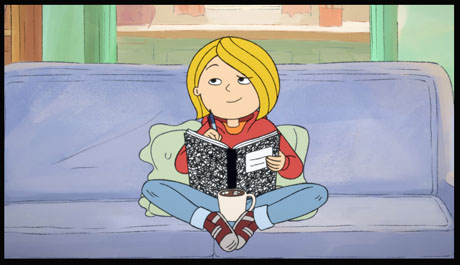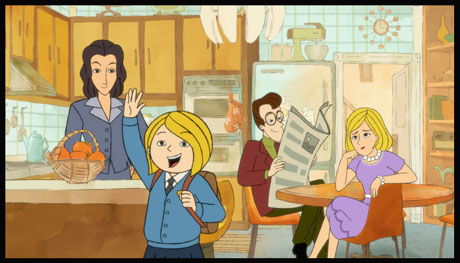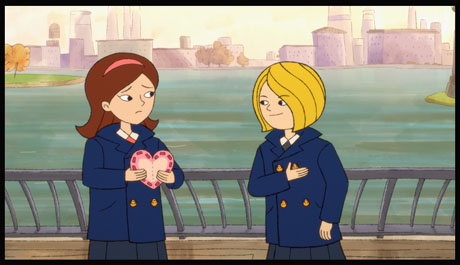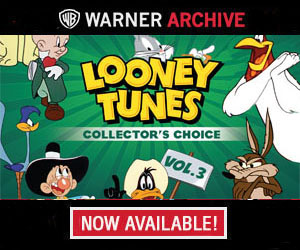
The Jim Henson Company’s Lisa Henson, daughter of the Sesame Street and Muppets icon, is executive producer of new AppleTV+ hand-drawn Harriet the Spy series (premiering this Friday November 19th). Henson shares with me her love of the story and central characters, as well as details on another exciting animated project she’s working on with an Oscar winning filmmaker. (This Animation Scoop Q&A was edited for length and clarity.)
Jackson Murphy: What do you look for in a project and what did you see, initially, in Harriet the Spy?
Lisa Henson: We are always looking for projects where we can be as creative as possible, as innovative as possible — and we don’t want to just do what everybody else is doing. We try to make every project special and not like anything else that’s available. When I first looked at Harriet the Spy for television because we found out the rights were available, it was presented to us as a live-action project. I was very excited, in my own mind, about doing it animated and doing it in-period. I felt like… there have been some adaptations of Harriet the Spy but nobody’s really captured the way the book feels, which is quite different from the movie. This is an adaptation of the book that really feels like Louise Fitzhugh’s book.

Lisa Henson: And the period is very important because not only is it a beautiful New York City of the early 1960s (which lends itself to animation and feels like 101 Dalmatians in a way — it’s nostalgic and a very special setting), I realized when I re-read the book that Harriet is an entirely modern child in a period world. The author’s vision of her as an 11-year-old girl who only wears boys’ clothing, who’s extremely independent, who does whatever she wants to do — she was such a iconoclastic character in that period that it’s a very different effect than if you just update it to the present day when so many kids have this sensibility. I really wanted to honor how unique, special and independent she is as a character by putting it in the period.
JM: I’m glad you did. I like the ’60s feel of it. I’m in Upstate NY near Albany, but I hadn’t been down to NYC in two years until the other day for an event.
LH: Good for you!
JM: It was great to be back in the city — I had missed it. You do a lot with New York City in this in terms of honoring it. What were your goals in wanting to honor the city, visually and through the stories?
LH: We looked at a lot of great photography from the period and tried to capture the way people saw New York City in the period. It’s a period of time when New York was very celebrated in a lot of art and photography. But we also touched upon special things, like the World’s Fair. We have a whole episode set at the World’s Fair, which just came and went in that one year. Of course we have the Empire State Building and the subways and the Upper East Side itself, which was in its heyday in that period. I feel like I’m going on and on about the period, but this is a funny show and a comedy show and a kids’ show. It’s not a period piece, per se. (laughs)

JM: Right. And you touched on this a little bit but…
LH: It sounds like you’ve seen it! How many episodes have you seen?
JM: Yes! I’ve seen three of the episodes and they’re great.
LH: Yay!
JM: It’s very nice. I love the look of it. And… you touched on this a little bit about her being modern. I feel like she’s a strong role model for today, especially in her growth in confidence through each of the episodes. How did you want to shine a light on that element of Harriet?
LH: This show is serialized. Each episode stands on its own, but there’s a strong arc across the series, which is very similar to the arc in the book. She goes from being highly observant and interested in a lot of things, but she’s also a little bit unaware of other people’s feelings and not as empathetic as she will be by the end of the season. The fact that she’s a judgmental girl makes her hilarious, and I think we all relate to being “judgy”, as they say about kids today. She has to kind of get over that in the course of the series and seeing her mature is rewarding for the audience and we do it in a realistic way. She matures by going through some painful episodes and some embarrassing episodes, and some hilariously wrong things happen to her. It’s not an easy path to maturity for this little girl.
JM: I think families will really like watching her — her growth, her confidence, and I love her relationship with Ole Golly because as I’m listening to Beanie [Feldstein] and Jane [Lynch]: the way they’re delivering the dialogue back and forth… these two characters have a code and a relationship that’s kind of all their own. It’s very unique in that sense. How important was that to you and these two great actors?
LH: That relationship is the core of the whole series because she has a true mentor in Ole Golly. We wanted to model that idealized relationship between a kid and an adult where they really love each other and they really, really care about each other. And Ole Golly is amazing with Harriet. You listen to those conversations in the show… I am a parent of kids who are now in their 20s, and I’m kind of in awe of how wonderfully Ole Golly manages Harriet. She does have boundaries with her. She doesn’t let her get away with absolutely everything, but she does encourage that independence. She encourages her to take risks and try things and explore. Of course, exploring is one of the major themes of the show. In order to know everything, [Harriet] has to spy and that’s the only way in which she spies. We try to tell everybody: it’s not a spy show. She’s not actually a spy. She’s only spying so she can observe and learn and be a great writer.

JM: Right. Mentor is the perfect word. I started young in this world of interviewing people and reviewing movies and talking with adults and having adults as guides is a really important thing. Obviously you’re part of an incredible family legacy with mentors. Did you take that a little bit and see that in this show?
LH: Well that’s interesting. My father was my mentor, although he’s very different personality-wise from Ole Golly. (laughs) He was similarly, perhaps, non-judgmental and allowed kids to be kids. I think Ole Golly is unique in the world of adults in Harriet the Spy because she really sees Harriet for who she is and she wants her to be the best Harriet that she can be — and not just to fit in or fulfill her parents’ expectations, or really anybody’s expectations. She’s like, “Who do YOU wanna be?” And she’s helping her realize those goals.
JM: Absolutely. AppleTV+ has had a growing slate of family content. It’s been very strong. You’ve had a great relationship with them through Fraggle Rock. How has the partnership been from your perspective and where do you see that going?
LH: We love how idealistic Apple is about children’s programming. They really encourage good, strong themes, meaningful content and change-making. We’ve gotten into some very interesting conversations with the executives about using television as a force of positive change-making in the world. We love that idealistic side. But they’re also quite perfectionist about quality, and we like that too. I think The [Jim] Henson Company is kind of known for high-quality creative programming, and Apple is all about quality. You will not see any junkie animation on AppleTV+. (laughs)

JM: Very true. I grew-up with Julie Andrews films. I had a special relationship with my grandmother involving Mary Poppins. So being able to watch Julie’s Greenroom was so sweet and great for the arts. What was it like working with Julie Andrews and making that show come alive?
LH: Oh my gosh. Getting to work with Julie was actually a dream come true. We had a general meeting with her and she wanted to do a children’s program that she would host. And brainstorming with her about what that show could be was one of the most rewarding creative processes I’ve ever had because Julie knows absolutely EVERYTHING about the performing arts. And she had not thought about doing a show about the performing arts, but she has an encyclopedic knowledge of it. It was so delightful to talk to her about breaking those episodes, what we could teach kids… she works with her daughter [Emma Walton Hamilton] and they’re a beautiful team together. And there were only the 13 episodes of it on Netflix, but I hope people continue to discover it because I still don’t think anyone’s done a show like that — before or since.
JM: And you’re working on something really interesting: you’re a producer on [director] Guillermo Del Toro’s upcoming stop-motion version of Pinocchio for Netflix. What can you share at this point? Guillermo has such a vision when it comes to his films.
LH: I’ve been working on the project for a decade. We started our development on it a long, long time ago. It has become an incredibly personal movie for Guillermo. He’s just poured his heart into it, and as you know Pinocchio is a very emotional story and… the bond and love between Gepetto and Pinocchio has always been touching in the extreme. The pathos in that is incredible. So I think Guillermo’s making a beautiful film that’s very personal and emotional and of course a feat with artistry, because he wants to do things with stop-motion that have never been done before.
JM: I can’t wait to see it. I saw the Roberto Benigni version [of Pinocchio] that came out at the end of last year. And that gave me a whole new perspective on everything Pinocchio. And now I can’t wait for this. Thank you for your time today, Lisa, and congratulations on Harriet the Spy.
LH: Thank you. I REALLY hope people tune-in and watch it, because we’re very proud of it.
- INTERVIEW: Jeff Fowler On “Knuckles” And “Sonic 3” - April 22, 2024
- INTERVIEW: “Inside Out 2” Director And Producer On Pixar Sequel - April 16, 2024
- INTERVIEW: “Puffin Rock And The New Friends” And 25 Years Of Cartoon Saloon - April 10, 2024


 November 18th, 2021
November 18th, 2021  Jackson Murphy
Jackson Murphy  Posted in
Posted in  Tags:
Tags: 






